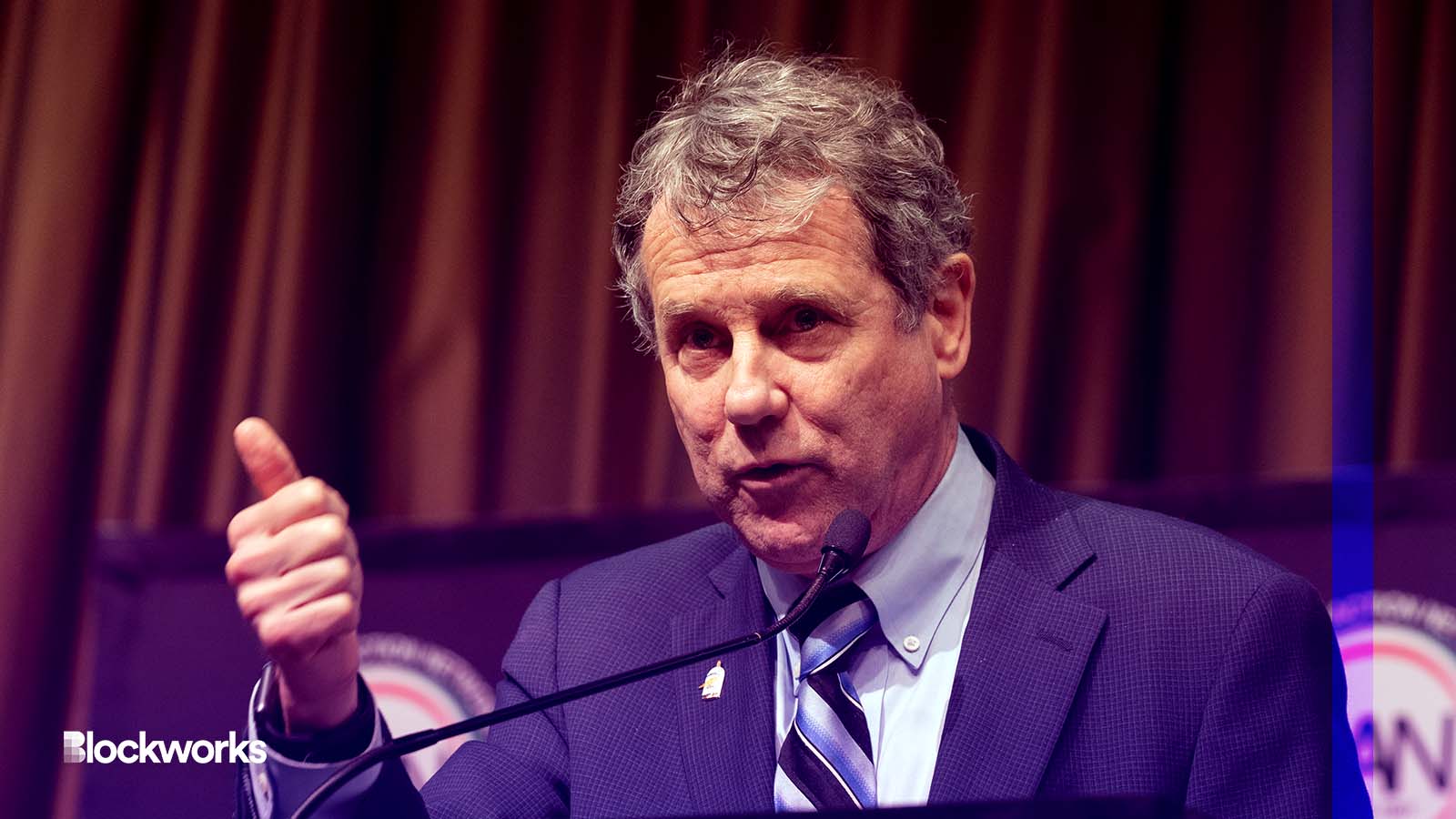Senate Hearing: “Overreach Could Set Us Back By a Decade”
Senators provide few indications of future US policy direction

Ohio Senator Sherrod Brown | lev radin/Shutterstock.com modified by Blockworks
The first congressional crypto-focused hearing of the year concluded Tuesday without a clear path forward for digital asset regulation. Senators mostly touted their respective party lines, with Democrats taking a more strict approach and Republicans advocating for more innovation-friendly rules, although there were some exceptions.
Senators were mostly concerned with crypto token classification, how different agencies will work together on dividing roles and how to approach the growing desire for crypto to become part of the banking system. Based on today’s hearing, investors and industry members will have to continue to wait for substantial policy.
Blockworks live updates:
10:36 am — Chairman Sherrod Brown (D, OH) kicks off the hearing with a recap of the past six months in the crypto industry. He highlights last year’s numerous crypto company Super Bowl ads, compared with the lack of any digital asset-focused commercials this past Sunday night.
Crypto investment vehicles are “speculative products run by reckless companies, we know that’s true,” Sen. Brown added.
10:47 am — Sen. Tim Scott (R-SC) starts his statement by calling on the Securities and Exchange Commission and head Gary Gensler to testify on the slew of enforcement actions taken against crypto firms in recent months.
“If Chair Gensler has time to do the morning talk shows, he has time to come to the Hill,” Sen. Scott said.
10:54 am — Jeng kicks off her prepared testimony with a recap of her crypto experience. She currently serves as the chief global regulatory officer and general counsel for the Crypto Council for Innovation.
Future crypto policy needs to focus on innovation and encouraging access, efficiency and efficacy for consumers, Jeng added.
“In this complex and nuanced space, the details matter,” she said, referring to the ongoing debate around cryptocurrency classification.
10:58 am — “The cost of being late to regulation is becoming apparent to all of us,” Yadav said, referencing the recent collapse in markets with FTX and Celsius’ bankruptcies and Three Arrows Capitals’ meltdown.
Yadav advocated for a self-regulated regime to allow cryptocurrency exchanges to write rules and monitor markets. Bringing exchanges within the framework for oversight would benefit the whole industry, she argues.
11:03 am — Chairman Brown asks Reiners about the recent enforcement actions from the SEC.
“The Crypto industry is very fond of criticizing the SEC for regulation by enforcement, but the truth is that is just a catchphrase the industry uses to deflect from the fact they willingly chose to operate outside the regulatory parameter,” Reiners said.
11:09 am — Sen. Scott points out that SEC disclosures are not terribly accessible for the average person.
“Disclosures are great,” he said, but they have to be understandable.
Other countries are moving faster than the US on developing a regulatory framework, he added, again calling on Chair Gensler to appear before the committee.
11:16 am — Reiners emphasizes that most cryptos are probably securities in regards to the Howey test. The cryptos that are seen as commodities are also in a gray area because the CFTC does not oversee the commodity spot market, putting the assets in regulatory limbo.
The SEC needs to create a new classification of security for crypto assets, he said.
11:20 am — Sen. Menendez: “The key element I’ll be looking for in digital assets is a clear prioritization of transparency and investor protection, while also providing for stability and safe innovation.”
11:23 am — “The important thing is we get it right,” Reiners said. The countries that are first to crypto regulation are not necessarily creating effective rules, he said, pointing to the Bahamas.
Crypto is not good for financial markets, investors or national security, he accused.
“We should not be embracing something that is undermining our sovereignty,” he said.
11:33 am — Reiners: “we should do everything we can to restrict crypto from entering the banking system.”
Regulators, investors and bank customers need to be more aware of banks’ exposure to crypto, he added.
11:40 — Prof. Jeng points to the ability of blockchain technology to improve cross-border foreign exchange in a way that’s more efficient and equitable for citizens.
Unbanked and under banked around the world can benefit from lower costs and improved access to financial services, given common sense guardrails.
Mr. Reiners disputes that crypto provides financial services access benefits.
11:46 am — Crypto’s founding principle was to be different than the traditional financial system, but, ironically, companies now want to be part of the traditional system, Reiners said.
“Crypto, the industry, has been trying very, very hard to integrate into the traditional financial system,” Reiners said.
11:57 am — Crypto is the top choice for money launderers and those conducting illicit activities, Sen. Elizabeth Warren (D-MA) said. Reiners agreed, adding that no crypto firms should be able to avoid anti-money laundering compliance requirements.
The hearing, titled “Crypto Crash: Why Financial System Safeguards are Needed for Digital Assets,” featured three witnesses, none of whom are representatives of crypto companies.
The witnesses were Lee Reiners, policy director of the Duke Financial Economics Center; Linda Jeng, visiting scholar on financial technology at the Georgetown Institute of International Economic Law and Yesha Yadav of Vanderbilt University Law School.
Get the news in your inbox. Explore Blockworks newsletters:
- The Breakdown: Decoding crypto and the markets. Daily.
- 0xResearch: Alpha in your inbox. Think like an analyst.






